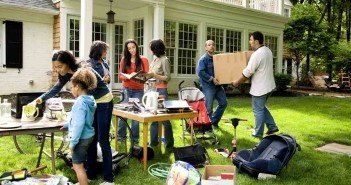 The Board Room.Sarah Jacobs
The Board Room.Sarah Jacobs
There are few places as important to American business as the New York Stock Exchange.
The exchange is celebrating its 225th anniversary this week, and a multimillion-dollar renovation completed in February pays homage to its past in every conference room. Walking around the exchange's many rooms above the trading floor, you'll see historical artifacts like a signed letter from Thomas Edison, a gift from Czar Nicholas II of Russia, and a signed guitar from Jimmy Page.
We recently took a tour of the stock exchange floor and its newly renovated rooms to see what a typical day is like inside the New York Stock Exchange.
California-based real estate development company Five Point Holdings held its IPO on the morning of our visit. Excitement filled the floor as the opening bell rang and the executive team cheered.
After the bell, traders worked during the price discovery process on the exchange floor.
Just behind that commotion, CNBC anchors were on set for "Squawk on the Street."
NYSE president Tom Farley was also on the floor, congratulating Five Point employees and giving press interviews.
Just next to the trading floor is the Buttonwood Room, where 250 brokers, clerks, market makers, and clearing firm employees work.
Between the trading floor and the Buttonwood Room, the tech team works tirelessly in what is called "the ramp." This team makes sure that everything is working properly on the floor and that communication is moving smoothly.
A view of the trading floor from "the ramp."Sarah Jacobs Upstairs on the seventh floor, you'll find the Buttonwood Agreement, the signed document that founded the New York Stock Exchange in 1792. Named after the tree that the men sat under while signing it, the agreement holds the signatures of 24 founding members of the New York Stock Exchange.
Board rooms, conference centers, and restaurants were completely redone as part of the renovation that finished this February. Odes to the exchange's past are scattered throughout the building.
An event space.Sarah Jacobs The restaurant 1792, named for the year the exchange was founded, also sits on the seventh floor.
The restaurant is only open to listed companies, member firms, the floor community, NYSE employees, and their guests.
A framed menu from 1943 shows the dishes that 1792 once served. Back then, an appetizer like split pea soup was just 25 cents, while the menu's most expensive item was a $1.25 lobster salad.
Originally opened in 1903, the Board Room was designed by architect George B. Post and has been used by the NYSE's governing body for meetings, receptions, and events ever since.
Although the room has gone through various renovations over the years, the original style has been kept intact. Here, a piece of the original wall was kept in place and framed in honor of its history.
The "Wall Regulator Clock," hanging center, was purchased in 1867 to be placed behind the president on the original trading floor. On this clock, the minute hand dominates the other two faces in order to facilitate the 1871 call market, when each stock traded in turn for exactly five minutes.
Originally a natural skylight, the room's ceiling was covered after a terrorist attack in September of 1920, when a horse and buggy packed with dynamite exploded on the corner of Broad and Wall Streets. While the actual skylight was left undamaged, the ceiling of the Board Room was covered for safety reasons.
During renovations in 2016, an LED film was laid above the skylight, creating a natural-looking light that can actually be controlled to match the weather outside.
Also within the Board Room is a monumental stone and silver urn that was a gift from Czar Nicholas II of Russia in 1904.
While not as elaborate as the Board Room, other conference rooms still subtly pay homage to the NYSE's past. This room, known as the Bond Room, has framed old bonds that have been intricately painted.
Inside the Clerk's Room is a signed and framed letter from Thomas Edison, who made vast improvements on the stock ticker, a telegraph that was able to send prices to investors around the country.
Source: History.com
An event space dedicated to Muriel Siebert, the first woman to hold a NYSE seat, holds the colorful coat she would often wear out on the trading floor.
Also on display in a conference room is the guitar of Led Zeppelin's Jimmy Page, who played on the exchange floor when Warner Music Group went public in 2005.
Source: The New York Times
Andy Warhol's art also graces the walls of that same conference room.
Open-floor plans make up much of the office space.
Breakfast and lunch is served in the cafeteria, which has a steep discount for employees.
 The Board Room.Sarah Jacobs
The Board Room.Sarah Jacobs

























